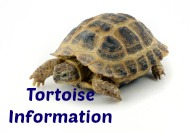|
|
|
|
wsp_rte_replace_marker?

|
They can live for a long time with proper care and husbandry. Habitat - Tortoises need a clean, dry, roomy cage. Most do well if kept around 80 F but discuss with your veterinarian for individual species requirements. A ceramic heat source is a good way to regulate the temperature in your tortoise enclosure. A full spectrum (UVA/UVB) light should be provided during the day. Replace the bulb every 6 months to ensure adequate UV penetration. Diet - They should have a large bowl of fresh water to drink and bathe in. They need a balanced diet of leafy greens, fruits, and vegetables. Food should be dusted with calcium powder containing vitamin D3 and/or a multivitamin powder.
Veterinary Care - They should visit the vet once or twice a year for a physical exam and intestinal parasite check via a fecal sample. Tortoises often have calcium and vitamin A deficiencies from an incorrect diet and/or husbandry. Tortoises can have intestinal and external parasites. They are also prone to getting respiratory diseases, bacterial infections, and neoplasia. Remember to always wash your hands after handling any animal, especially reptiles and amphibians. See information from the CDC about reptiles and contagious salmonella infections.
|



